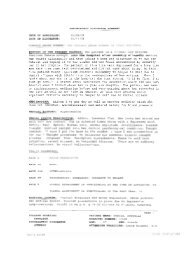C - Organized Mobbing
C - Organized Mobbing
C - Organized Mobbing
Create successful ePaper yourself
Turn your PDF publications into a flip-book with our unique Google optimized e-Paper software.
i<br />
1<br />
letter<br />
proposed that the women could meet weekly at the sauna in a public Pool<br />
nat was apparently acknowledged by Ulrike Poppe with the<br />
comment: "Women sweat for peace." The rest of the meeting was dedicated<br />
to the organization of future activities. At the end the report has to implicitly<br />
acknowledge the failure of the decomposition measure while still trying<br />
-<br />
make good of it:<br />
In the estimation of the source [Hagerl Poppe and Bohley did no longer<br />
appear as much in control [of the group] as before their internment. both<br />
[women] the absolute demand to lead is no longer SO clearly discernible.<br />
Here is a concrete example of how Stasi tried to selectively validate those<br />
understandings floating around in the group that served its purposes best.<br />
It did so with the help of the anonymous letter, recognizing certain understandings<br />
that were deemed to have been corroborated by the course of<br />
events and that obviously had considerable resonance with what a number<br />
of women must have felt or thought already. This resonance is the real<br />
kernel from which the operation could proceed, lending the anonymous<br />
its initial credibility. The Stasi also used the direct commentary of the<br />
secret informants in the discussion to actively steer understandings i~ this<br />
direction.<br />
From the Stasi's perspective, these interventions would ideally have<br />
been sufficient enough to propel the dynamics of the group along a selfreinforcing<br />
trajectory of destructive self-politics. The reasons why this did<br />
not happen reveal the limits of decomposition measures as techniques of<br />
control. In chapter 4 I argued that all recognitions of understandings are<br />
precarious because in voicing them the status of an authority is potentially<br />
put in jeopardy. This means that neither the letter nor the oral interventions<br />
of the informants could be worded in such strong terms that they<br />
would have risked losing their authority. In fact, the necessity of continuing<br />
secrecy forced the Stasi to ambiguous interventions. Monika Hager, the<br />
informant in question, for example, had to counterbalance indirect insinuations<br />
that Irena Kukutz might be a Stasi spy with assistance to Poppe and<br />
Bohley, justifying their restrictive information policy. Finally, the effective<br />
application of selective recognition presupposed authority. With only<br />
a few exceptions (e.g., Wolfgang Wolf, Ibrahim Bohme), however, secret<br />
informants were not among the small group of most authoritative figures<br />
in movement circles, even though many of them advanced to important<br />
second-tier positions. The reason is simple. As activists have pointed out<br />
to me time and again, authority within the movements came with a track<br />
record, with ideas for action and leadership in carrying them out. However,<br />
the Stasi did not want their secret informants to take the initiative. Theywere<br />
typically not employed as agents provocateurs; given the political circum-





